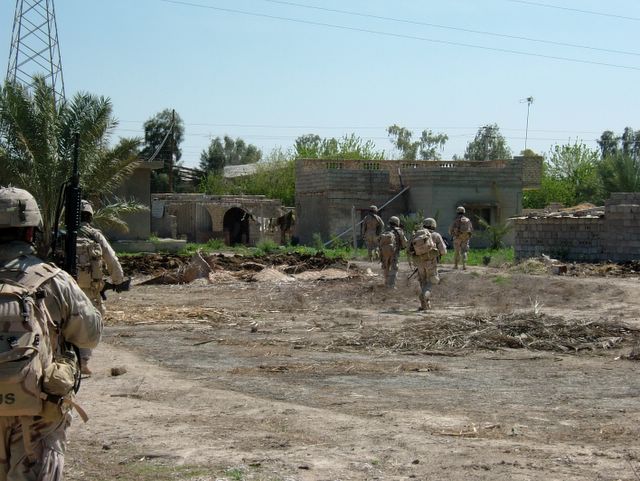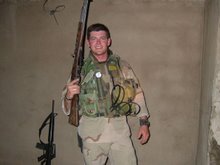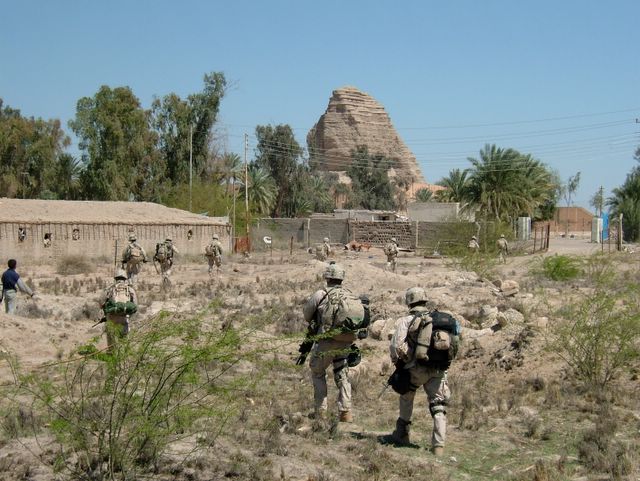U.S. Urges Iraq to Take Advantage of Lull
By PAUL von ZIELBAUER
Published: December 3, 2007
BAGHDAD, Dec. 2 — Deputy Secretary of State John D. Negroponte, in Baghdad after a week of meetings with Iraqi provincial leaders, said Sunday that lawmakers must take advantage of the decline in daily violence in recent months to pass crucial legislation and improve basic government services. 
Mr. Negroponte, a former ambassador to Iraq, said if Iraq’s sharply divided Parliament did not reach a consensus “in the near future” on matters that would improve the lives of Iraqis, it risked losing the gains in security that had come in part because of the increased number of American combat troops.
“It’s one thing to have brought the violence under some semblance of control,” Mr. Negroponte said during a news conference in the heavily fortified Green Zone here, after meeting Iraqi officials in Baghdad and seven other provinces in Iraq’s north, south and west. “But it’s another matter now to follow up with the necessary reconstruction and stabilization projects that will safeguard regions and protect them from this type of violence.”
In particular, he said, Washington was counting on Iraqi lawmakers to pass two languishing bills that would help stabilize the central government: an oil revenue-sharing law, and a measure that would allow more former members of Saddam Hussein’s Baath Party to take government jobs.
“It would be extremely helpful if this could be passed and go forward as an indication that the people and government and the legislature of Iraq are prepared to build on the security gains that have been achieved,” he said.
Mr. Negroponte also said a referendum vote in Kirkuk on whether to join the Kurdish-controlled region would probably not occur this year. “Clearly it’s not going to be possible between now and the end of this year to mount a referendum,” he said.
Also on Sunday, the leader of Iraq’s largest Sunni Arab political bloc said he and his fellow lawmakers would return to Parliament after his release from a three-day house confinement. The lawmaker, Adnan al-Dulaimi, the leader of the Iraqi Consensus Front, told an Iraqi television station on Sunday that he was allowed to travel from his house to a hotel in the Green Zone.
After Mr. Dulaimi left his house, Iraqi Army troops arrived and removed the blast walls surrounding it, said his son, Muthanna Adnan al-Dulaimi. The removal of the walls appeared to suggest that Mr. Dulaimi would no longer have the benefit of government protection unless he was in the Green Zone.
Consensus Front members walked out of Parliament on Saturday to protest what they said was the government’s restriction on Mr. Dulaimi, part of a law-enforcement operation on Thursday in which dozens of his security guards were arrested after a car bomb was discovered in an alley near his Baghdad office compound.
The episode was another in a series illustrating the profound problems within the Iraqi government in stopping infiltration by insurgents. While Mr. Dulaimi’s colleagues privately expressed doubt that the politician, an elderly man, was directly involved in the criminal activities that his guards were accused of engaging in, he also seemed unable to stop them.
Also Sunday, a roadside bomb in the Mansour district of west Baghdad killed two policemen and wounded four others, an Interior Ministry official said. Gunmen in the same neighborhood also killed a police official as he was heading to work, the Interior Ministry official said, speaking on condition of anonymity.
Iraqi security forces were subject to other attacks around Iraq on Sunday. In Baquba, northeast of Baghdad, a suicide bomber blew himself up near a police patrol, wounding 14 people, a city police official said. In Hawija, west of Kirkuk, gunmen killed five Iraqi solders as they drove out of an army base, a police captain said.
In Falluja, Iraqi security forces found a mass grave containing about 20 bodies of men, women and children, the police said, Reuters reported. In Mosul, Iraqi policemen discovered six bodies, including those of two policemen, in different areas of the city, the Interior Ministry official said.
Alissa J. Rubin contributed reporting from Baghdad, and Iraqi employees of The New York Times from Mosul, Diyala and Kirkuk.












